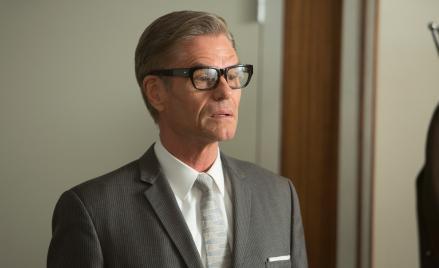Hanna, Paul,
It’s fair to note that Mad Men—as best I can recall—has yet to introduce a black character who commands the full respect and admiration of our crew at SCDP. It’s been all secretaries, maids, elevator operators, busboys, and, yes, menacing thieves. I’d be eager to see how the show might handle a black business owner who becomes Don’s client, or a black copy writer who joins Peggy’s team.
At the same time, Paul, I suspect the relative invisibility of minorities on Mad Men is not untrue to the midcentury mindspace these white characters inhabit. And I tend to come down in the same place I did when we all had this fight over Girls: 1) I’d prefer we not shame our televisual auteurs into fulfilling vague racial quotas. Writers are allowed to make choices that feel authentic to the story they wish to tell. 2) At the same time, our current golden age of television deserves a more diverse chorus of voices. I would absolutely love to see a show that compellingly tackles New York in the ‘60s from an African-American perspective, or a sharp and clever drama set at a black-owned marketing agency.
My real problem with Mad Men these days is less about its mix of characters than about the one character at the center of the action. I am … deep breath, gulp … tired of Don.
In Don’s early seasons, I couldn’t get enough of him. He had a dark and thorny past, but it was a gift of sorts: It lent him remarkable insight into the depravities of human nature. Don could X-ray the American id, suss out weaknesses, and instantly spot the Maslowian hierarchy of needs that undergirds every decision we make—even buying floor wax. The big lie at the heart of Don’s existence (he was literally not who he said he was) kept him especially attuned to the hypocrisy and perversion hidden beneath the rigidly pleasant social cues of his era.
He was also—perhaps precisely because he was so cognizant of his own failings—a fundamentally decent guy in many ways. The guy who mentored Peggy, and took visible delight in her advancement. The guy who saw Joan’s superlative competence, and spoke to her as a peer instead of a piece of ass. That guy hasn’t been around much of late, has he? We’ve been spending more time with the guy who ditches Ginsberg’s creative work in a taxi, the guy who orders Sylvia to crawl on all fours, the guy who sometimes treats Peggy like a glorified admin.
As Mad Men begins its long denouement (next season will be its last—I vote to fade out on a shot of the whole gang road tripping to Altamont to see the Stones!), it is no longer a show about a guy who has survived a difficult past and transformed it into a source of strength. It’s about a guy with a deeply twisted upbringing that he can’t escape, that gnarls his heart, and that makes him a disquieting presence on our screens. He is a broken being. Until I see a few more flashes of his decency I will find him unlikable, unrelatable, and edging toward unwatchable. Frankly, I’m starting to think I’d rather hang out with Peggy and Ginsberg.
OK, enough dissatisfaction. It can be tempting to watch this show as a cryptographer, deciphering symbols and allusions. Or as a sociologist, critiquing portrayals of period norms. Or as a psychologist, contemplating the pathologies embedded in these characters’ behaviors. (I’m reminded of Stan’s comment: “Delivering mail into combat—that’d be a bad job.” I wonder if Matthew Weiner feels he’s braving enemy fire when he brings us this TV show and then we tear apart his carefully crafted story arcs.) It’s also nice sometimes to just sit back and enjoy an exquisitely written, beautifully acted TV program. In that spirit, I’d like to highlight a few small moments I loved in this episode:
- Though it went unremarked upon in the show, Betty is once again trim and platinum-tressed. She’s ready for her campaign close up. And amid all the fear and relief and confusion in the wake of Grandma Ida’s scary visit, she suddenly barks, out of nowhere, “Do you know Henry’s running for office?” Betty is the undisputed master of the self-centered non sequitur.
- Harry Hamlin and his character, Jim Cutler, are becoming a welcome if repulsive Sunday evening television presence. Cutler is so oily, so soulless, that he makes Roger Sterling look like a mensch by comparison. After peeping on Stan and Wendy having sex, Cutler assures Ted he “kept an eye on” the vulnerable young daughter of their recently deceased friend.
- Ken Cosgrove’s amphetamine-laced tapdance. If I could frame that GIF and hang it on my wall, I would.
What if they turn off the TV?
Seth
